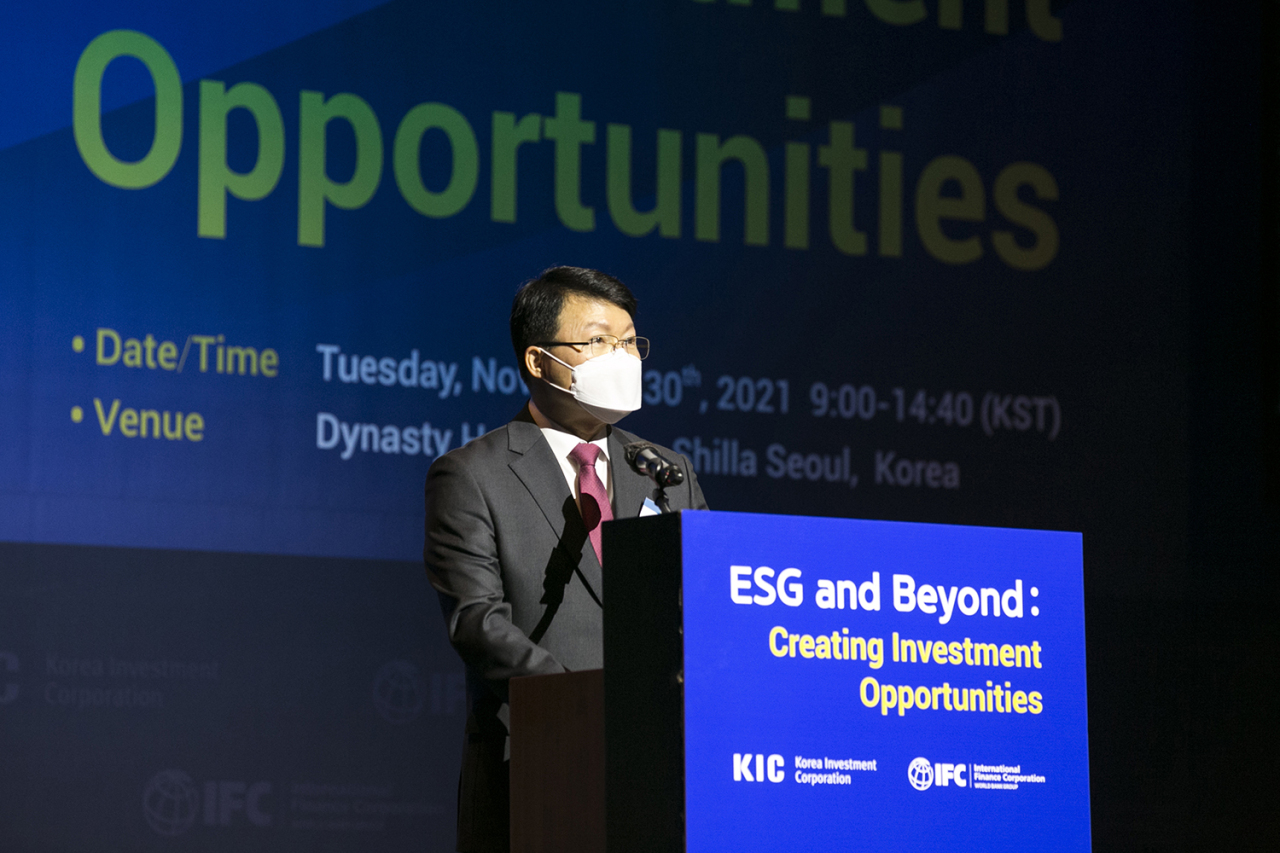
ESG and impact investment will offer a new way for investors to make financial returns while leaving a positive, social and environmental impact, and South Korea hopes to spread the practice of “responsible investment,” Korea Investment Corporation CEO Jin Seoung-ho said Tuesday.
The chief of the country’s sovereign wealth fund said ESG investment, which looks at environmental, social and governance factors, and impact investment, which aims to make money and measureable social change, are the new norms as the world fights climate change.
“As recent as last month, we saw growing calls for stronger action on reducing carbon emissions at the COP26 climate summit,” Jin said at a conference KIC and the International Finance Corporation jointly held in Seoul to discuss ESG and impact investments.
Alfonso Garcia Mora, regional vice president for Asia and Pacific at the IFC, said countries will face difficulties putting in motion the practice to look at both the ESG factors and impact affected by investments, but the upside is clear in the long run.
“Many view climate finance in developing countries as an opportunity to contribute to their climate targets. … A collective approach can help create an even bigger impact,” Garcia Mora said, referring to the battle for carbon neutrality as the starting point to see impact investment in action.
Neil Gregory, chief thought leadership officer at the IFC, described Asia as the region with the biggest growth potential because Asia accounts for $4.5 trillion of 10.3 trillion managed by sovereign wealth funds globally that look to make impact investment.
Gregory said he saw “market-beating returns” on the impact investment his firm had made, saying it will be a more sustainable model as long as companies doing the practice publicly disclose their alignment with the principles guiding the impact investment, set forth by the IFC.
Launched in April 2019, the nine principles offer a framework for investors to ensure that impact considerations are integrated throughout the investment cycle. Over 140 privately and publicly owned funds and institutions follow the rule. In November, the Export-Import Bank of Korea signed onto the guideline.
Andrew Kuper, founder and CEO of LeapFrog Investments, said the senior management should handle the ESG and impact investment so companies take the issue more seriously. And firms should reward those in charge of the investment in a way that drives their performance, he added.
“This is not philanthropy versus capitalism,” Kuper said, referring to critics who say impact investment negates capitalism because it forces investors to put social change alongside a financial return when they would see the change as a byproduct in traditional capitalism.
“Profit and purpose are not tradeoffs,” Kuper said.
Meanwhile, Ali Izadi, head of Asia Pacific research at Bloomberg NEF, said emerging markets will not be left behind the trend to transition to impact investment as long as they roll out the right set of frameworks and policies and get them up and running.
“It’s not just about getting the technology deployed,” Izadi said.
The chief of the country’s sovereign wealth fund said ESG investment, which looks at environmental, social and governance factors, and impact investment, which aims to make money and measureable social change, are the new norms as the world fights climate change.
“As recent as last month, we saw growing calls for stronger action on reducing carbon emissions at the COP26 climate summit,” Jin said at a conference KIC and the International Finance Corporation jointly held in Seoul to discuss ESG and impact investments.
Alfonso Garcia Mora, regional vice president for Asia and Pacific at the IFC, said countries will face difficulties putting in motion the practice to look at both the ESG factors and impact affected by investments, but the upside is clear in the long run.
“Many view climate finance in developing countries as an opportunity to contribute to their climate targets. … A collective approach can help create an even bigger impact,” Garcia Mora said, referring to the battle for carbon neutrality as the starting point to see impact investment in action.
Neil Gregory, chief thought leadership officer at the IFC, described Asia as the region with the biggest growth potential because Asia accounts for $4.5 trillion of 10.3 trillion managed by sovereign wealth funds globally that look to make impact investment.
Gregory said he saw “market-beating returns” on the impact investment his firm had made, saying it will be a more sustainable model as long as companies doing the practice publicly disclose their alignment with the principles guiding the impact investment, set forth by the IFC.
Launched in April 2019, the nine principles offer a framework for investors to ensure that impact considerations are integrated throughout the investment cycle. Over 140 privately and publicly owned funds and institutions follow the rule. In November, the Export-Import Bank of Korea signed onto the guideline.
Andrew Kuper, founder and CEO of LeapFrog Investments, said the senior management should handle the ESG and impact investment so companies take the issue more seriously. And firms should reward those in charge of the investment in a way that drives their performance, he added.
“This is not philanthropy versus capitalism,” Kuper said, referring to critics who say impact investment negates capitalism because it forces investors to put social change alongside a financial return when they would see the change as a byproduct in traditional capitalism.
“Profit and purpose are not tradeoffs,” Kuper said.
Meanwhile, Ali Izadi, head of Asia Pacific research at Bloomberg NEF, said emerging markets will not be left behind the trend to transition to impact investment as long as they roll out the right set of frameworks and policies and get them up and running.
“It’s not just about getting the technology deployed,” Izadi said.

















![[KH Explains] Hyundai's full hybrid edge to pay off amid slow transition to pure EVs](http://res.heraldm.com/phpwas/restmb_idxmake.php?idx=652&simg=/content/image/2024/04/18/20240418050645_0.jpg&u=20240418181020)

![[Today’s K-pop] Zico drops snippet of collaboration with Jennie](http://res.heraldm.com/phpwas/restmb_idxmake.php?idx=642&simg=/content/image/2024/04/18/20240418050702_0.jpg&u=)